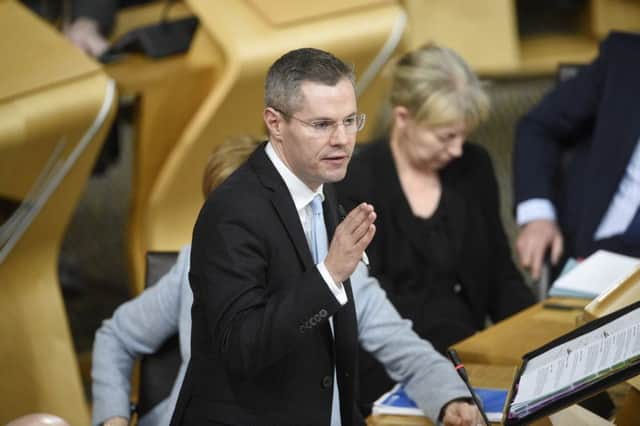Tax rate hike risks hitting revenue, Derek Mackay warned


This week Finance Secretary Derek Mackay is expected to unveil a budget that uses Holyrood’s new powers to raise income tax further in Scotland.
With the minority SNP administration requiring opposition backing to get the budget through parliament Mackay is likely to rely on support from the Greens, a party advocating radical tax rises.
Advertisement
Hide AdAdvertisement
Hide AdNicola Sturgeon and Mackay have signalled they intend to put up income tax, despite some of their colleagues expressing concern at the impact it could have on business.
Yesterday independence supporting group Business for Scotland also warned against putting up income tax while calling for a review of the Scottish Stamp Duty replacement Land Buildings and Transaction Tax (LBTT).
Business for Scotland chief executive Gordon MacIntyre-Kemp said he was against increasing income tax and added that LBTT had to be reformed to free up the property market.
Business-friendly sources in the SNP are concerned that raising income tax too much on the highest earners will result in a loss of tax take.
One said: “With the Greens as the only tail that is going to wag the dog you can see the conundrum that Derek Mackay faces.
“Putting taxes up doesn’t necessarily mean you get more revenue. We are about to put that to test for the first time, it would appear. But we need to be very careful that this doesn’t damage revenue or the economy.”
MacIntyre-Kemp said: “Increasing taxes across the board in the hope of raising some £200m extra revenue is not a positive move.”
Instead, he said, the UK Government could raise cash by closing loopholes that allow large corporations to transfer profits out of the country.
Advertisement
Hide AdAdvertisement
Hide AdOn LBTT, he said: “We would like the Finance Minister to review the performance of this tax with a view to refining an optimal rate. Markets have been, becoming more volatile, there is great uncertainty around Brexit and the top end of the property market is not turning over as quickly as before. So it may be that the level this tax is set at needs to be adjusted for maximum return and to optimise market activity.”
Scots earning more than £43,000 already pay more income tax as a result of Scottish ministers freezing the salary threshold for the 40p higher rate band. South of the border, the Chancellor has announced that the threshold will go up to £46,350.
Sturgeon signalled more hikes are on the way this week when she published a paper suggesting those earning £24,000 and over would pay more income tax.
In Thursday’s budget Mackay may choose to create new tax bands that would allow him to produce a tax cut for the lowest paid while introducing a modest tax rise on the basic rate for those earning £24,000 or more.
Those in the higher (£43,000 and above) and additional (those earning more than £150,000) tax brackets are likely to be hit by income tax rises.
The Finance Secretary has pledged to put economic growth at the heart of his budget.